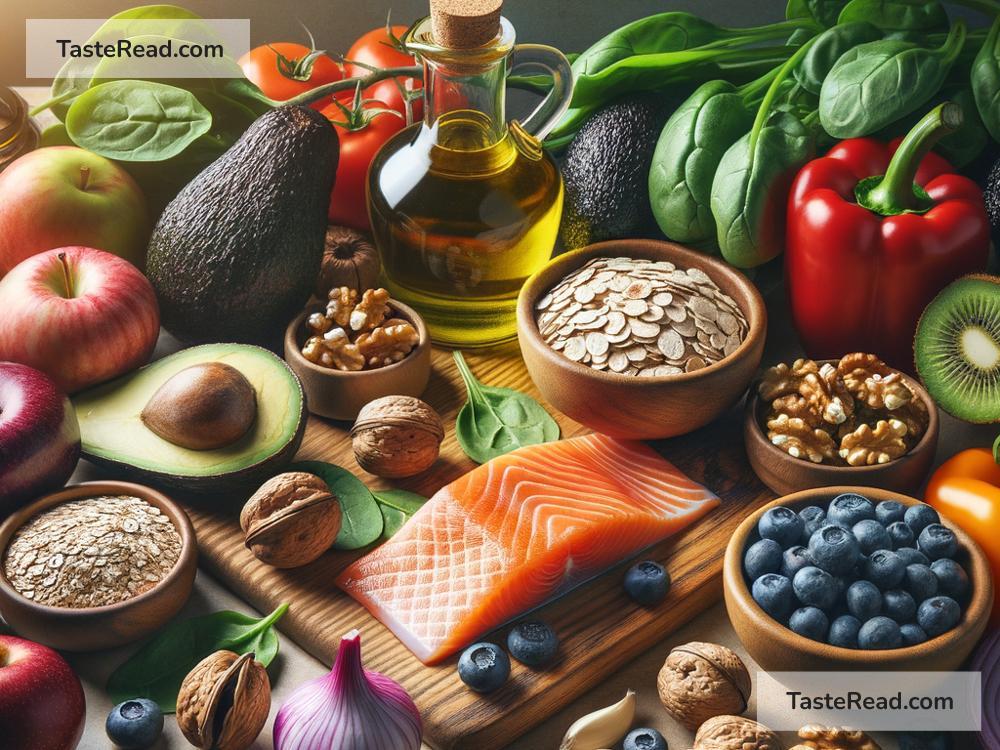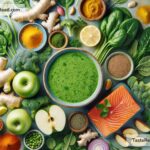Foods That Help Reduce Atherosclerosis: Eating Your Way to a Healthier Heart
Atherosclerosis is a big word for something that can sneak up on your health. It happens when plaque builds up in the walls of your arteries, making it harder for blood to flow to your heart, brain, and other parts of your body. Over time, atherosclerosis can lead to serious problems like heart attacks and strokes. The good news? Your diet can play a big role in keeping your arteries clear and your heart healthy.
Eating the right foods can help lower inflammation, improve cholesterol levels, and prevent plaque from sticking to your arteries. Let’s explore some of the best foods you can eat to fight atherosclerosis and keep your heart in top shape.
1. Fatty Fish
Fatty fish like salmon, mackerel, sardines, and tuna are rich in omega-3 fatty acids. These healthy fats help lower triglycerides (a type of fat in your blood), reduce inflammation, and prevent your arteries from becoming clogged. Omega-3s can also improve the function of the blood vessels, keeping them flexible and strong.
Aim to eat fatty fish at least two times a week for maximum heart benefits. If you don’t eat fish, you can consider omega-3 supplements, but it’s always better to get nutrients from whole foods.
2. Whole Grains
Whole grains like oats, barley, brown rice, and quinoa are excellent for heart health thanks to their high fiber content. Fiber helps reduce “bad” LDL cholesterol, which is one of the main contributors to plaque buildup.
Oats, in particular, contain a type of soluble fiber called beta-glucan, which is especially effective at lowering cholesterol levels. Swap white bread and refined grains for whole grain options to support your heart and keep your arteries healthy.
3. Nuts and Seeds
Nuts like almonds, walnuts, and pistachios are packed with healthy fats, fiber, and important nutrients like vitamin E and magnesium. These nutrients help reduce inflammation and lower cholesterol levels. Walnuts are especially rich in alpha-linolenic acid (ALA), a type of omega-3 fat that is great for heart health.
Seeds like chia seeds, flaxseeds, and sunflower seeds are also superfoods for your heart. They’re loaded with fiber, antioxidants, and plant-based omega-3s that help prevent plaque from forming in your arteries.
A small handful of nuts or seeds (about 1 ounce) per day can work wonders. Just be mindful not to overeat them, as they are calorie-dense.
4. Fruits and Vegetables
Fruits and vegetables are loaded with antioxidants, vitamins, and minerals that fight inflammation and keep your blood vessels healthy. They also contain fiber, which helps keep cholesterol levels under control.
Some of the best fruits and veggies for battling atherosclerosis include:
- Berries: Strawberries, blueberries, and raspberries are rich in antioxidants like anthocyanins, which protect your arteries from damage.
- Citrus Fruits: Oranges, grapefruits, and lemons are high in vitamin C, which improves the health of your blood vessels.
- Leafy Greens: Spinach, kale, and collard greens are loaded with nutrients like vitamin K and nitrates that boost circulation and reduce artery stiffness.
- Avocados: Full of healthy fats and potassium, avocados help lower LDL cholesterol and improve your heart health.
- Tomatoes: Tomatoes contain lycopene, a powerful antioxidant that reduces cholesterol and inflammation.
Aim for a colorful variety of fruits and vegetables and try to fill half your plate with them at each meal.
5. Olive Oil
Olive oil is a cornerstone of the heart-healthy Mediterranean diet. It’s rich in monounsaturated fats and antioxidants that reduce inflammation and improve cholesterol levels. Studies show that people who regularly consume extra virgin olive oil have lower risks of heart disease.
Switch out less healthy fats like butter and margarine for olive oil in your cooking and salad dressings. Just remember to use it in moderation, as it’s high in calories.
6. Legumes
Beans, lentils, chickpeas, and peas are fantastic for heart health. They’re full of fiber and plant-based protein, which help lower cholesterol and stabilize blood sugar levels. Eating legumes regularly can also help reduce inflammation in your body.
Try adding legumes to your soups, salads, or stews, or enjoy them as a plant-based protein alternative to meat.
7. Green Tea
Green tea is more than just a soothing drink—it’s a heart helper too. It’s rich in antioxidants called catechins, which help lower cholesterol and improve arterial function. Drinking green tea daily can also help prevent oxidative stress, a type of damage to your cells that contributes to atherosclerosis.
Swap your sugary drinks or regular coffee for a cup of green tea to support your heart health.
8. Garlic
Garlic is packed with compounds like allicin, which have been shown to reduce blood pressure, lower cholesterol, and improve overall heart health. Studies suggest that eating garlic regularly may help slow the progression of atherosclerosis.
Add fresh garlic to your dishes for a flavorful and heart-friendly boost.
9. Dark Chocolate
Good news: Not all sweets are bad for your heart! Dark chocolate that’s at least 70% cocoa contains antioxidants called flavonoids that help reduce inflammation and improve blood vessel health. Moderation is key, though—stick to a small piece to satisfy your sweet tooth without overdoing the sugar.
Final Thoughts
Reducing atherosclerosis isn’t about following a restrictive diet or cutting out your favorite foods entirely. It’s about making smart, heart-healthy choices and including more nutrient-rich foods in your daily meals. By eating fish, whole grains, fruits, vegetables, nuts, and heart-healthy fats, you can take control of your health and reduce your risk of serious heart problems.
Remember, changing your diet is just one piece of the puzzle. Regular exercise, stress management, and avoiding smoking can also go a long way in keeping your arteries clear and your heart strong. Start with small steps, and over time, you’ll feel the difference in your overall health.


